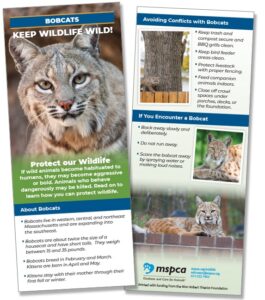-
Adopt
-
Veterinary Care
Services
Client Information
- What to Expect – Angell Boston
- Client Rights and Responsibilities
- Payments / Financial Assistance
- Pharmacy
- Client Policies
- Our Doctors
- Grief Support / Counseling
- Directions and Parking
- Helpful “How-to” Pet Care
Online Payments
Referrals
- Referral Forms/Contact
- Direct Connect
- Referring Veterinarian Portal
- Clinical Articles
- Partners in Care Newsletter
CE, Internships & Alumni Info
CE Seminar Schedule
Emergency: Boston
Emergency: Waltham
Poison Control Hotline
-
Programs & Resources
- Careers
-
Donate Now
 Becoming comfortable around humans is extremely dangerous for wildlife, so it is important to do everything we can to prevent that from happening. Thanks to a generous grant from the Nion Robert Thieriot Foundation, the MSPCA is proud to be able to offer informational pamphlets on avoiding conflicts with bobcats AT NO CHARGE to any Massachusetts municipality. Learn more on how to request these pamphlets.
Becoming comfortable around humans is extremely dangerous for wildlife, so it is important to do everything we can to prevent that from happening. Thanks to a generous grant from the Nion Robert Thieriot Foundation, the MSPCA is proud to be able to offer informational pamphlets on avoiding conflicts with bobcats AT NO CHARGE to any Massachusetts municipality. Learn more on how to request these pamphlets.
Bobcats in Massachusetts
Bobcats are common in the central and western parts of the state but can also be found in the northeast and southeast. They are considered a furbearer species and may be hunted or trapped if in accordance with the management program. These devices to catch otters can catch any animal, wild or domestic, who walks or swims into them, causing intense suffering and death. The MSPCA opposes legislation that would expand trapping in Massachusetts.
Bobcats weigh between 15-35 pounds and are 28-47 inches long, twice the size of a domestic house cat. Although their paws are often misidentified as domestic cats, their bushy hair and short bobbed tail allow them to stand out.
They breed from February to March and produce one litter each year in April or May, with an average litter size of two kittens. The mothers are the sole providers and nurse the kittens until they are two months old, and they remain with their families until they are fully grown.
Bobcats are carnivores and prey primarily on rabbits, hares, squirrels, mice, muskrats, and birds. They may prey on larger animals, such as deer if their food supply is scarce. They have a defined home range identified through scent and tend to be mobile at dawn and dusk. They remain active year-round and prefer wild habitats to climb trees to rest, hide from predators and catch prey.
Possible Conflicts and Solutions
Bobcats can be seen in suburbs and backyards; however, they rarely cause conflicts with humans. To avoid any conflicts with bobcats:
- Keep trash and compost secure and BBQ grills clean
- Keep bird feeder areas clean
- Place chickens in a secure pen or coop and place them away from remote or wooded areas
- Feed companion animals indoors
- Close off crawl spaces under porches, decks, or the foundation
Fun Facts
- Bobcats are the only wild cat in Massachusetts
- They are shy and solitary animals
- They can travel up to four miles daily
- Their claws are retractable
Sources and More Information
MassWildlife – Learn More About Bobcats
Articles in the news
Live 959 – Video of Bobcat in MA Neighborhood
Wicked Local, Report: Waltham woman has close encounter with bobcat, Nov 2, 2021.




